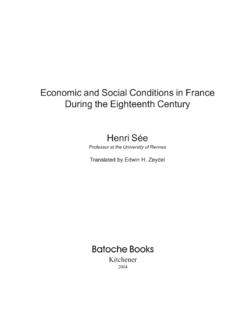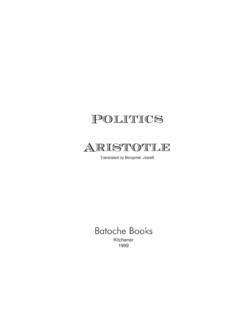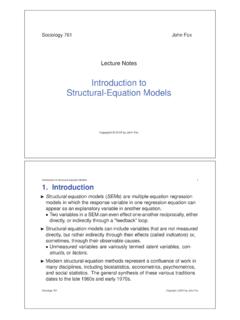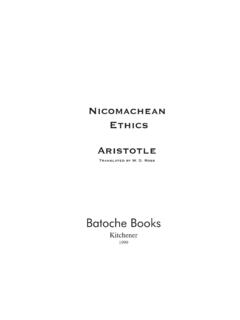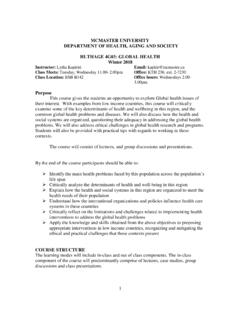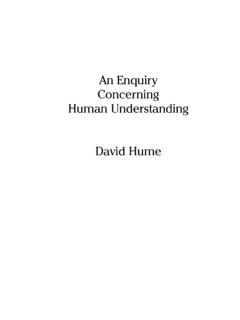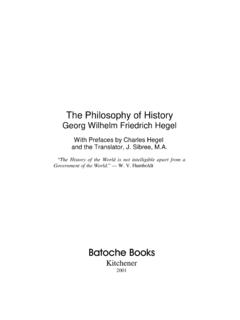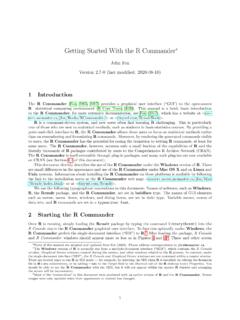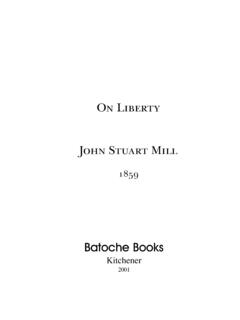Transcription of of a Common-wealth - Faculty of Social Sciences
1 Leviathanorthe Matter, Forme, & Powerof Thomas Hobbes of MalmesburyLondon,printed for Andrew Crooke, at the Green Dragonin St. Pauls Church-yard1651 Prepared for the McMaster University Archive of the History ofEconomic Thought, by Rod .. 7 The First Part: Of Man .. 9I: Of Sense .. 9II: Of Imagination .. 10 III: Of the Consequence or Train of Imaginations .. 15IV: Of Speech .. 19V: Of Reason and Science .. 26VI: Of the Interior Beginnings of Voluntary Notions, Commonlycalled the Passions; and the Speeches by which They are Ex-pressed .. 31 VII: Of the Ends or Resolutions of Discourse .. 40 VIII: Of the Virtues Commonly called Intellectual; and theirContrary Defects .. 42IX: Of the Several Subject of Knowledge .. 51X: Of Power, Worth, Dignity, Honour and Worthiness .. 53XI: Of the Difference of Manners .. 60 XII: Of Religion .. 66 xiii : Of the natural Condition of mankind as Concerning theirFelicity and Misery .. 76 XIV: Of the First and Second natural Laws, and Of Contracts.
2 79XV: Of Other Laws of Nature .. 88 XVI: Of Persons, Authors, and Things Personated .. 98 The Second Part: Of Commonwealth .. 103 XVII: Of the Causes, Generation, and Definition of a 103 XVIII: Of the Rights of Sovereigns by Institution .. 1074/Thomas HobbesXIX: Of the Several Kinds of Commonwealth by Institution, and ofSuccession to the Sovereign Power .. 114XX: Of Dominion Paternal and Despotical .. 122 XXI: Of the Liberty of Subjects .. 129 XXII: Of Systems Subject Political and Private .. 137 XXIII: Of the Public Ministers of Sovereign Power .. 147 XXIV: Of the Nutrition and Procreation of a Commonwealth .. 151 XXV: Of Counsel .. 156 XXVI: Of Civil Laws .. 162 XXVII: Of Crimes, Excuses, and Extenuations .. 178 XXVIII: Of Punishments and Rewards .. 190 XXIX: Of Those Things that Weaken or Tend to the Dissolution ofa Commonwealth .. 197 XXX: Of the Office of the Sovereign Representative .. 205 XXXI: Of the Kingdom of God by Nature .. 218 The Third Part: Of a Christian Commonwealth.
3 228 XXXII: Of the Principles of Christian Politics .. 228 XXXIII: Of the Number, Antiquity, Scope, Authority, and Inter-preters of the Books of Holy Scripture .. 232 XXXIV: Of the Signification of Spirit, Angel, and Inspiration in theBooks of Holy Scripture .. 241 XXXV: Of the Signification in Scripture of Kingdom of God, ofHoly, Sacred, and Sacrament .. 251 XXXVI: Of the Word of God, and of Prophets .. 257 XXXVII: Of Miracles and their Use .. 269 XXXVIII: Of the Signification in Scripture of Eternal Life, Hell,Salvation, the World to Come, and Redemption .. 275 XXXIX: Of the Signification in Scripture of the Word Church . 288XL: Of the Rights of the Kingdom of God, in Abraham, Moses, theHigh Priests, and the Kings of Judah .. 290 XLI: Of the Office of our Blessed Saviour .. 299 XLII: Of Power Ecclesiastical .. 305 XLIII: Of What is Necessary for a Man s Reception into theKingdom of Heaven .. 365 The Fourth Part: Of the Kingdom of Darkness .. 378 XLIV: Of Spiritual Darkness From Misinterpretation ofScripture.
4 378 XLV: Of Demonology and Other Relics of the Religion of 399 Leviathan/5 XLVI: Of Darkness from Vain Philosophy and FabulousTraditions .. 415 XLVII: Of the Benefit that Proceedeth from such Darkness, and toWhom it Accrueth .. 430A Review and Conclusion .. 437 IntroductionNature (the art whereby God hath made and governs the world) is by the artof man, as in many other things, so in this also imitated, that it can make anartificial animal. For seeing life is but a motion of limbs, the beginningwhereof is in some principal part within, why may we not say that allautomata (engines that move themselves by springs and wheels as doth awatch) have an artificial life? For what is the heart, but a spring; and thenerves, but so many strings; and the joints, but so many wheels, givingmotion to the whole body, such as was intended by the Artificer? Art goesyet further, imitating that rational and most excellent work of Nature, by art is created that great Leviathan called a Commonwealth, or State(in Latin, Civitas), which is but an artificial man, though of greater statureand strength than the natural , for whose protection and defence it was in-tended; and in which the sovereignty is an artificial soul, as giving life andmotion to the whole body; the magistrates and other officers of judicatureand execution, artificial joints; reward and punishment (by which fastenedto the seat of the sovereignty, every joint and member is moved to performhis duty) are the nerves, that do the same in the body natural ; the wealth andriches of all the particular members are the strength; salus populi (the people ssafety) its business; counsellors, by whom all things needful for it to knoware suggested unto it, are the memory; equity and laws, an artificial reasonand will; concord, health; sedition, sickness.
5 And civil war, death. Lastly,the pacts and covenants, by which the parts of this body politic were at firstmade, set together, and united, resemble that fiat, or the Let us make man,pronounced by God in the describe the nature of this artificial man, I will considerFirst, the matter thereof, and the artificer; both which is , how, and by what covenants it is made; what are the rights8/Thomas Hobbesand just power or authority of a sovereign; and what it is that preservethand dissolveth , what is a Christian , what is the Kingdom of the first, there is a saying much usurped of late, that wis-dom is acquired, not by reading of books, but of men. Consequently where-unto, those persons, that for the most part can give no other proof of beingwise, take great delight to show what they think they have read in men, byuncharitable censures of one another behind their backs. But there is an-other saying not of late understood, by which they might learn truly to readone another, if they would take the pains; and that is, Nosce teipsum, Readthyself: which was not meant, as it is now used, to countenance either thebarbarous state of men in power towards their inferiors, or to encouragemen of low degree to a saucy behaviour towards their betters; but to teachus that for the similitude of the thoughts and passions of one man, to thethoughts and passions of another, whosoever looketh into himself andconsidereth what he doth when he does think, opine, reason, hope, fear, etc.
6 ,and upon what grounds; he shall thereby read and know what are the thoughtsand passions of all other men upon the like occasions. I say the similitude ofpassions, which are the same in all men, desire, fear, hope, etc.; not thesimilitude of the objects of the passions, which are the things desired, feared,hoped, etc.: for these the constitution individual, and particular education,do so vary, and they are so easy to be kept from our knowledge, that thecharacters of man s heart, blotted and confounded as they are with dissem-bling, lying, counterfeiting, and erroneous doctrines, are legible only to himthat searcheth hearts. And though by men s actions we do discover theirdesign sometimes; yet to do it without comparing them with our own, anddistinguishing all circumstances by which the case may come to be altered,is to decipher without a key, and be for the most part deceived, by too muchtrust or by too much diffidence, as he that reads is himself a good or let one man read another by his actions never so perfectly, it serveshim only with his acquaintance, which are but few.
7 He that is to govern awhole nation must read in himself, not this, or that particular man; butmankind: which though it be hard to do, harder than to learn any languageor science; yet, when I shall have set down my own reading orderly andperspicuously, the pains left another will be only to consider if he also findnot the same in himself. For this kind of doctrine admitteth no other First PartOf ManI: Of SenseConcerning the thoughts of man, I will consider them first singly, andafterwards in train or dependence upon one another. Singly, they areevery one a representation or appearance of some quality, or other acci-dent of a body without us, which is commonly called an object. Whichobject worketh on the eyes, ears, and other parts of man s body, and bydiversity of working produceth diversity of original of them all is that which we call sense, (for there is noconception in a man s mind which hath not at first, totally or by parts,been begotten upon the organs of sense).
8 The rest are derived from know the natural cause of sense is not very necessary to thebusiness now in hand; and I have elsewhere written of the same at , to fill each part of my present method, I will briefly de-liver the same in this cause of sense is the external body, or object, which presseththe organ proper to each sense, either immediately, as in the taste andtouch; or mediately, as in seeing, hearing, and smelling: which pressure,by the mediation of nerves and other strings and membranes of the body,continued inwards to the brain and heart, causeth there a resistance, orcounter-pressure, or endeavour of the heart to deliver itself: which en-deavour, because outward, seemeth to be some matter without. And thisseeming, or fancy, is that which men call sense; and consisteth, as to theeye, in a light, or colour figured; to the ear, in a sound; to the nostril, inan odour; to the tongue and palate, in a savour; and to the rest of thebody, in heat, cold, hardness, softness, and such other qualities as wediscern by feeling.
9 All which qualities called sensible are in the objectthat causeth them but so many several motions of the matter, by which10/Thomas Hobbesit presseth our organs diversely. Neither in us that are pressed are theyanything else but diverse motions (for motion produceth nothing butmotion). But their appearance to us is fancy, the same waking that dream-ing. And as pressing, rubbing, or striking the eye makes us fancy a light,and pressing the ear produceth a din; so do the bodies also we see, orhear, produce the same by their strong, though unobserved action. For ifthose colours and sounds were in the bodies or objects that cause them,they could not be severed from them, as by glasses and in echoes byreflection we see they are: where we know the thing we see is in oneplace; the appearance, in another. And though at some certain distancethe real and very object seem invested with the fancy it begets in us; yetstill the object is one thing, the image or fancy is another.
10 So that sensein all cases is nothing else but original fancy caused (as I have said) bythe pressure that is, by the motion of external things upon our eyes,ears, and other organs, thereunto the philosophy schools, through all the universities ofChristendom, grounded upon certain texts of Aristotle, teach anotherdoctrine; and say, for the cause of vision, that the thing seen sendethforth on every side a visible species, (in English) a visible show, appari-tion, or aspect, or a being seen; the receiving whereof into the eye isseeing. And for the cause of hearing, that the thing heard sendeth forthan audible species, that is, an audible aspect, or audible being seen;which, entering at the ear, maketh hearing. Nay, for the cause of under-standing also, they say the thing understood sendeth forth an intelligiblespecies, that is, an intelligible being seen; which, coming into the under-standing, makes us understand. I say not this, as disapproving the use ofuniversities: but because I am to speak hereafter of their office in aCommonwealth, I must let you see on all occasions by the way whatthings would be amended in them; amongst which the frequency of in-significant speech is : Of ImaginationThat when a thing lies still, unless somewhat else stir it, it will lie stillfor ever, is a truth that no man doubts of.
